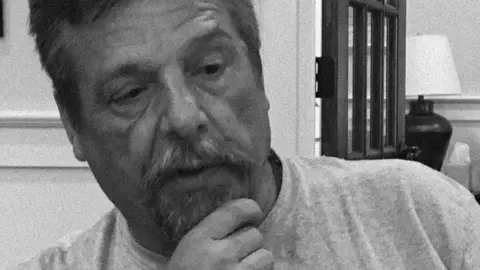Boeing whistleblower John Barnett found dead in US
 John Barnett
John BarnettA former Boeing employee known for raising concerns about the firm's production standards has been found dead in the US.
John Barnett worked for Boeing for more than 30 years before retiring in 2017.
In the days before his death, he had been giving evidence in a whistleblower lawsuit against the company.
Boeing said it was saddened to hear of Mr Barnett's passing. The Charleston County coroner confirmed his death to the BBC on Monday.
It said the 62-year-old had died from a "self-inflicted" wound on 9 March and police were investigating.
Mr Barnett had worked for the US plane giant for three decades, until his retirement in 2017 on health grounds.
From 2010, he was employed as a quality manager at the North Charleston plant. The facility builds the 787 Dreamliner, a state-of-the-art airliner used mainly on long-haul routes.
In 2019, Mr Barnett told the BBC that under-pressure workers had been deliberately fitting sub-standard parts to aircraft on the production line.
He also said he had uncovered serious problems with oxygen systems, which could mean one in four breathing masks would not work in an emergency.
He said soon after starting work in South Carolina he had become concerned that the push to get new aircraft built meant the assembly process was rushed and safety was compromised, something the company denied.
He later told the BBC that workers had failed to follow procedures intended to track components through the factory, allowing defective components to go missing.
He said in some cases, sub-standard parts had even been removed from scrap bins and fitted to planes that were being built to prevent delays on the production line.
He also claimed that tests on emergency oxygen systems due to be fitted to the 787 showed a failure rate of 25%, meaning that one in four could fail to deploy in a real-life emergency.
Mr Barnett said he had alerted managers to his concerns, but no action had been taken.
Boeing denied his assertions. However, a 2017 review by the US regulator, the Federal Aviation Administration (FAA), did uphold some of Mr Barnett's concerns.
It established that the location of at least 53 "non-conforming" parts in the factory was unknown, and that they were considered lost. Boeing was ordered to take remedial action.
On the oxygen cylinders issue, the company said that in 2017 it had "identified some oxygen bottles received from the supplier that were not deploying properly". But it denied that any of them were actually fitted on aircraft.
After retiring, he embarked on a long-running legal action against the company.
He accused it of denigrating his character and hampering his career because of the issues he pointed out - charges rejected by Boeing.
At the time of his death, Mr Barnett had been in Charleston for legal interviews linked to that case.
Last week, he gave a formal deposition in which he was questioned by Boeing's lawyers, before being cross-examined by his own counsel.
He had been due to undergo further questioning on Saturday. When he did not appear, enquiries were made at his hotel.
He was subsequently found dead in his truck in the hotel car park.
Speaking to the BBC, his lawyer described his death as "tragic".
In a statement Boeing said: "We are saddened by Mr. Barnett's passing, and our thoughts are with his family and friends."
His death comes at a time when production standards at both Boeing and its key supplier Spirit Aerosystems are under intense scrutiny.
This follows an incident in early January when an unused emergency exit door blew off a brand-new Boeing 737 Max shortly after take-off from Portland International Airport.
A preliminary report from the US National Transportation Safety Board suggested that four key bolts, designed to hold the door securely in place, were not fitted.
Last week, the FAA said a six-week audit of the company had found "multiple instances where the company allegedly failed to comply with manufacturing quality control requirements".
